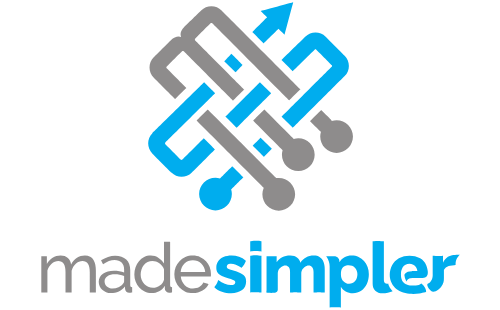Growth marketing has become a cornerstone of modern business success. At Made Simpler, we’ve seen firsthand how understanding key growth marketing terms can transform a company’s trajectory.
This guide breaks down essential growth marketing concepts, metrics, and strategies. Whether you’re a seasoned marketer or just starting out, mastering these terms will help you drive sustainable growth for your business.
Key Growth Marketing Metrics
Growth marketing relies on data-driven decisions. Five essential metrics can significantly impact your growth strategy.
Customer Acquisition Cost (CAC)
CAC measures the cost to gain a new customer. Calculate it by dividing total marketing and sales expenses by the number of new customers acquired in a specific period. For instance, $10,000 spent on marketing to acquire 100 new customers results in a CAC of $100.
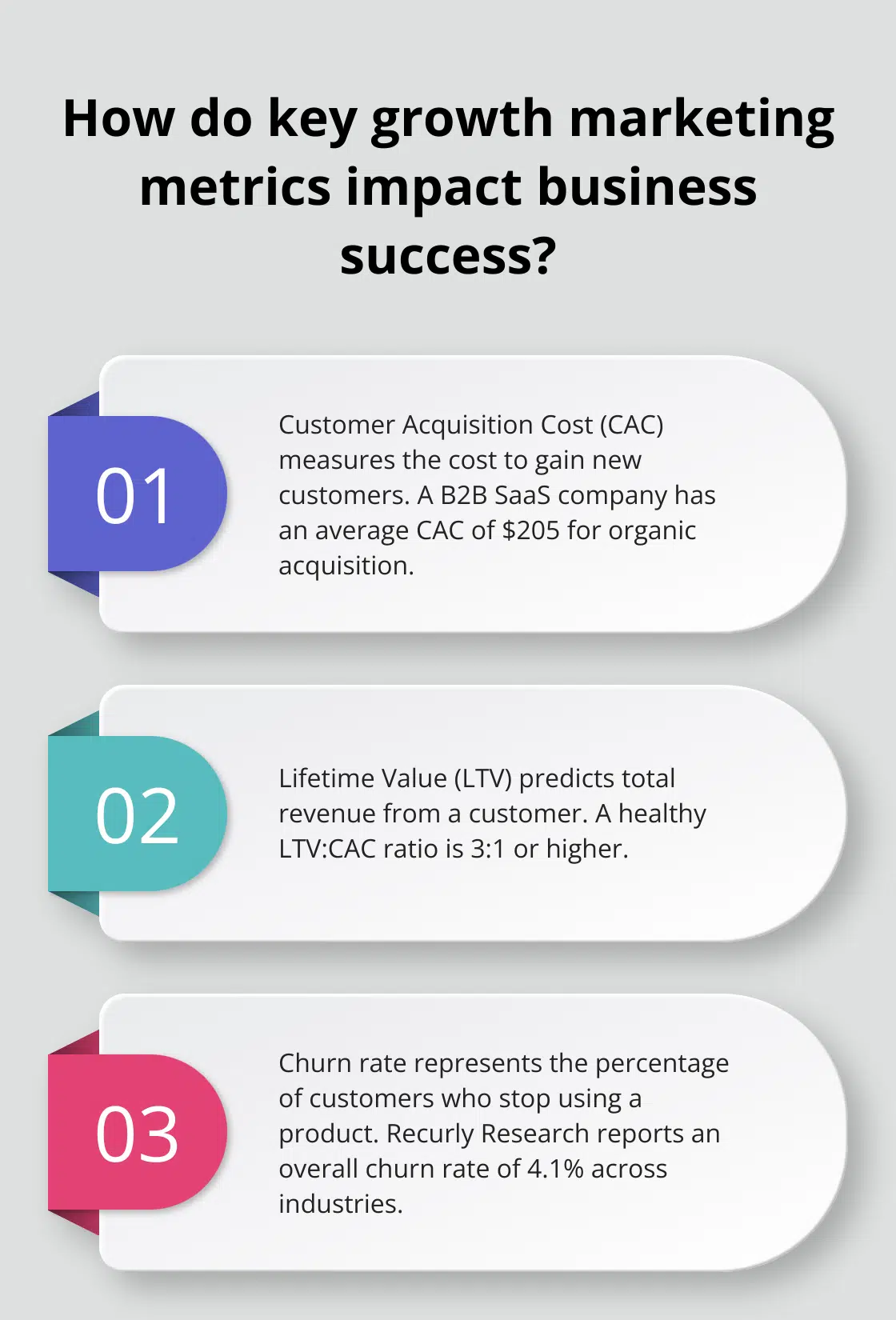
A high CAC can quickly deplete resources. To reduce it, optimize your marketing channels and improve conversion rates. A B2B SaaS company has an average CAC of $205 for organic acquisition.
Lifetime Value (LTV)
LTV predicts the total revenue a customer will generate throughout their relationship with your business. It’s vital for determining appropriate customer acquisition spending.
To calculate LTV, multiply the average purchase value by the average purchase frequency rate and the average customer lifespan. For example, a customer spending $100 per month for 3 years has an LTV of $3,600.
Try to maintain a healthy LTV:CAC ratio of 3:1 or higher. A lower ratio suggests the need for improved retention strategies or increased average order value.
Churn Rate
Churn rate represents the percentage of customers who stop using your product or service over a specific period. High churn rates can severely impact growth and profitability.
Calculate churn rate by dividing the number of lost customers during a period by the total customers at the beginning of that period. For example, starting with 1000 customers and losing 50 over a month results in a 5% monthly churn rate.
Recurly Research reports an overall churn rate of 4.1% across industries. Higher rates indicate a need to investigate customer departure reasons and implement retention strategies.
Net Promoter Score (NPS)
NPS measures customer loyalty and satisfaction based on a single question: “How likely are you to recommend our company/product/service to a friend or colleague?”
Responses are scored on a 0-10 scale (Promoters: 9-10, Passives: 7-8, Detractors: 0-6). Calculate your NPS by subtracting the percentage of Detractors from the percentage of Promoters.
A positive NPS (above 0) is generally good, but top-performing companies often achieve scores of 50 or higher. Regular NPS surveys provide valuable insights into customer satisfaction and areas for improvement.
Viral Coefficient
The viral coefficient measures how many new users an existing user brings to your product or service. It’s particularly important for businesses relying on word-of-mouth or referral marketing.
Calculate the viral coefficient by multiplying the number of invites sent per user by the conversion rate of those invites. For example, if each user sends 5 invites on average, and 20% of those invites convert to new users, your viral coefficient would be 1 (5 * 0.2).
A viral coefficient above 1 indicates exponential growth, while a coefficient below 1 suggests the need for additional acquisition methods.
These metrics offer a comprehensive view of your growth marketing efforts. Tracking and optimizing them enables informed decisions to drive sustainable business growth. Now, let’s explore the various channels and strategies that can help you improve these metrics and accelerate your growth.
Effective Growth Marketing Channels and Strategies
Growth marketing success depends on the use of the right channels and strategies. This chapter explores key approaches that consistently drive results for businesses.
Content Marketing: The Foundation of Growth
Content marketing forms the foundation of many successful growth strategies. It involves the creation of valuable, relevant material that attracts and retains a clearly defined audience. Content marketing costs 62% less than outbound marketing and generates more than three times as many leads.
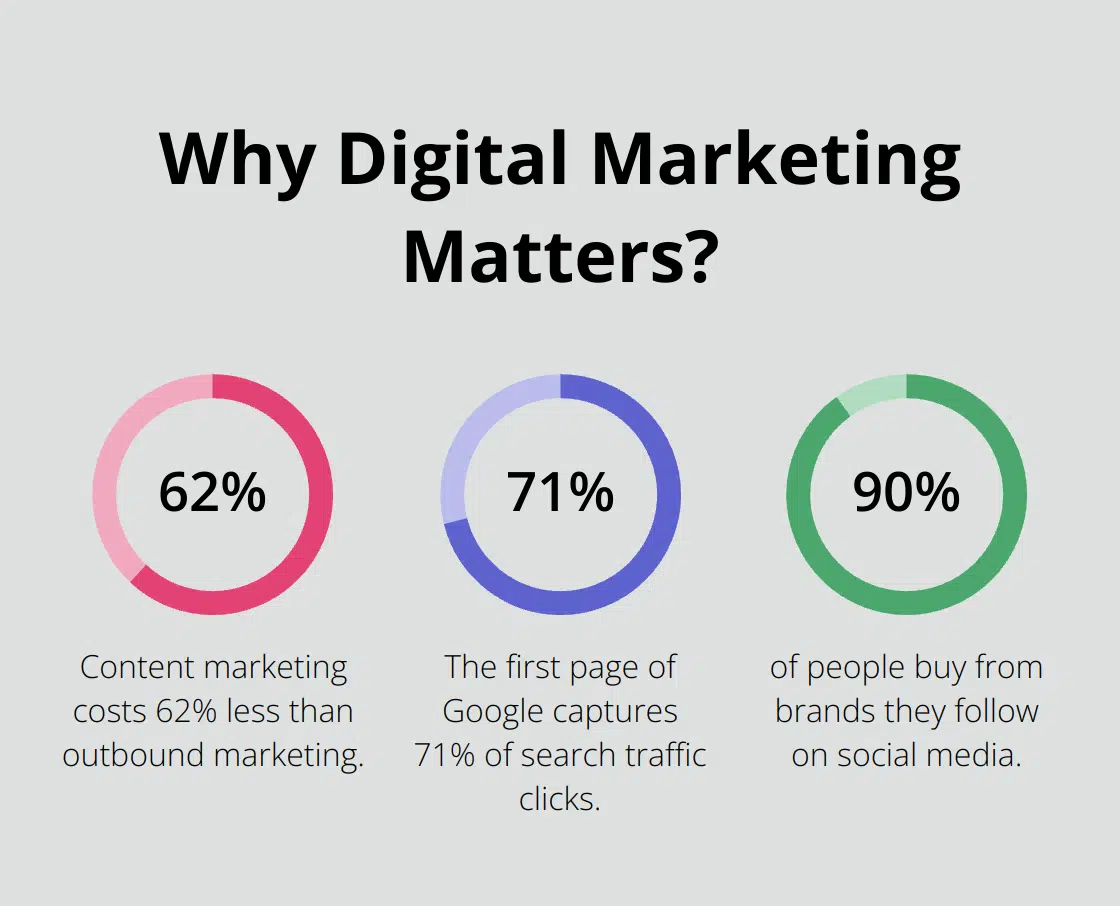
To maximize content marketing effectiveness:
- Solve your audience’s problems
- Create a consistent content calendar
- Repurpose content across multiple platforms
- Use data to inform your content strategy
SEO: Boosting Organic Visibility
Search Engine Optimization (SEO) remains essential for sustainable growth. It improves your website’s visibility in search results, driving organic traffic. Moz reports that the first page of Google captures 71% of search traffic clicks.
Key SEO tactics include:
- Conduct thorough keyword research
- Optimize on-page elements (title tags, meta descriptions, headers)
- Build high-quality backlinks
- Improve site speed and user experience
PPC: Quick Wins in Digital Advertising
Pay-Per-Click (PPC) advertising offers a fast track to visibility and leads. Google Ads can yield an average return on investment (ROI) of $8 for every $1 spent (according to Google Economic Impact).
To optimize PPC campaigns:
- Define clear campaign objectives
- Use negative keywords to refine targeting
- Implement ad extensions for better visibility
- Test and refine ad copy and landing pages continuously
Social Media: Engaging Your Audience
Social media marketing allows brands to connect directly with their audience. Hootsuite reports that 90% of people buy from brands they follow on social media.
Effective social media strategies include:
- Choose platforms where your audience is most active
- Create platform-specific content
- Engage with followers through comments and messages
- Leverage user-generated content
Email Marketing: Nurturing Leads and Customers
Email marketing remains one of the most effective channels for nurturing leads and retaining customers. Campaign Monitor found that email marketing can deliver an ROI of 4400%.
To improve email marketing results:
- Segment your email list for personalized messaging
- Use compelling subject lines to improve open rates
- Optimize for mobile devices
- Include clear calls-to-action (CTAs)
The strategic combination of these channels and strategies creates a robust growth marketing ecosystem. The next chapter will explore advanced growth hacking techniques that can further amplify your marketing efforts and drive exponential growth.
Advanced Growth Hacking Techniques
Growth hacking transcends traditional marketing strategies. It focuses on finding innovative, cost-effective ways to drive rapid growth. Let’s explore powerful growth hacking methods that can supercharge your marketing efforts.
A/B Testing for Optimization
A/B testing helps marketers observe how one version of a piece of marketing content performs alongside another. This method involves creating two versions of a webpage, email, or ad, with one element changed. You then split your audience between these versions to see which performs better.
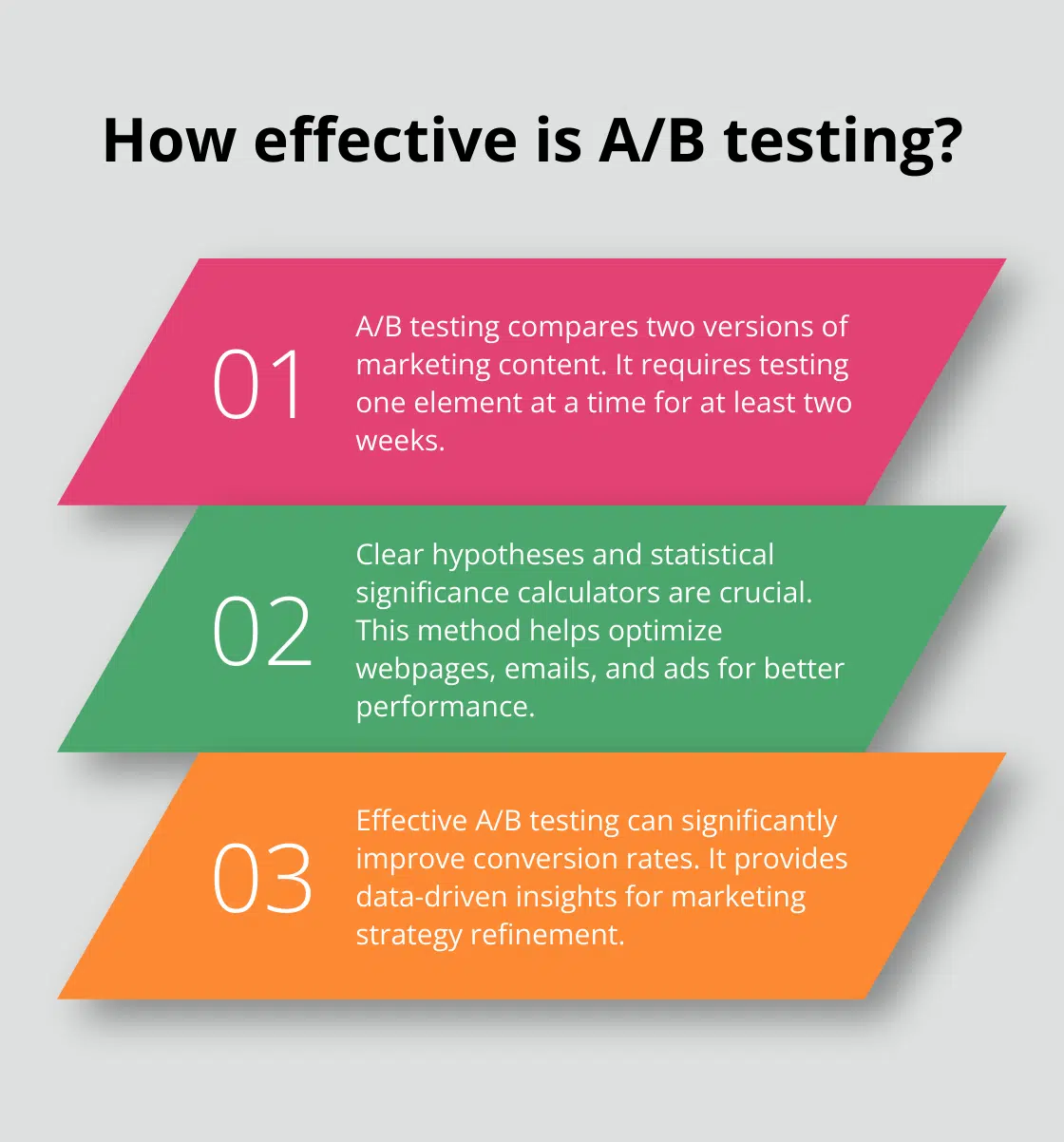
To implement effective A/B tests:
- Start with a clear hypothesis
- Test one element at a time
- Run tests for at least two weeks
- Use statistical significance calculators to validate results
Landing Page Optimization
Your landing page often creates the first impression for potential customers. Optimizing it can dramatically increase conversions.
Key elements to optimize include:
- Headline: Make it clear and compelling
- Call-to-Action (CTA): Use action-oriented language
- Social Proof: Include testimonials or client logos
- Page Speed: Try to achieve load times under 3 seconds
Viral Loops
Viral loops create self-perpetuating growth cycles where your existing users bring in new users. Dropbox’s referral program exemplifies this technique.
To create effective viral loops:
- Identify your viral trigger (what motivates users to share)
- Make sharing easy
- Offer a clear value proposition for both the sharer and the recipient
- Track and optimize your viral coefficient
Gamification Strategies
Gamification applies game-design elements to non-game contexts, driving engagement and retention. Duolingo uses gamification brilliantly with its streak system and leaderboards.
Effective gamification strategies include:
- Progress bars to show advancement
- Points or badges for completed actions
- Leaderboards to foster friendly competition
- Challenges or quests to encourage specific behaviors
Product-Led Growth
Product-led growth (PLG) strategies fuel scalable success. Companies like Grammarly, Slack, and Zoom have used PLG to achieve rapid expansion. The key is to create a product so good that users naturally want to share it.
To implement PLG:
- Offer a freemium model or free trial
- Focus on user onboarding and activation
- Build sharing and collaboration features into your product
- Use in-app messaging to guide users to key features
These advanced growth hacking techniques can significantly accelerate your business growth. However, they require constant testing, iteration, and optimization.
Final Thoughts
Growth marketing terms provide a powerful toolkit for driving measurable business success. These concepts enable data-driven decision-making, optimization of marketing efforts, and achievement of sustainable growth. The metrics, channels, strategies, and techniques we’ve explored form the foundation of effective growth marketing.
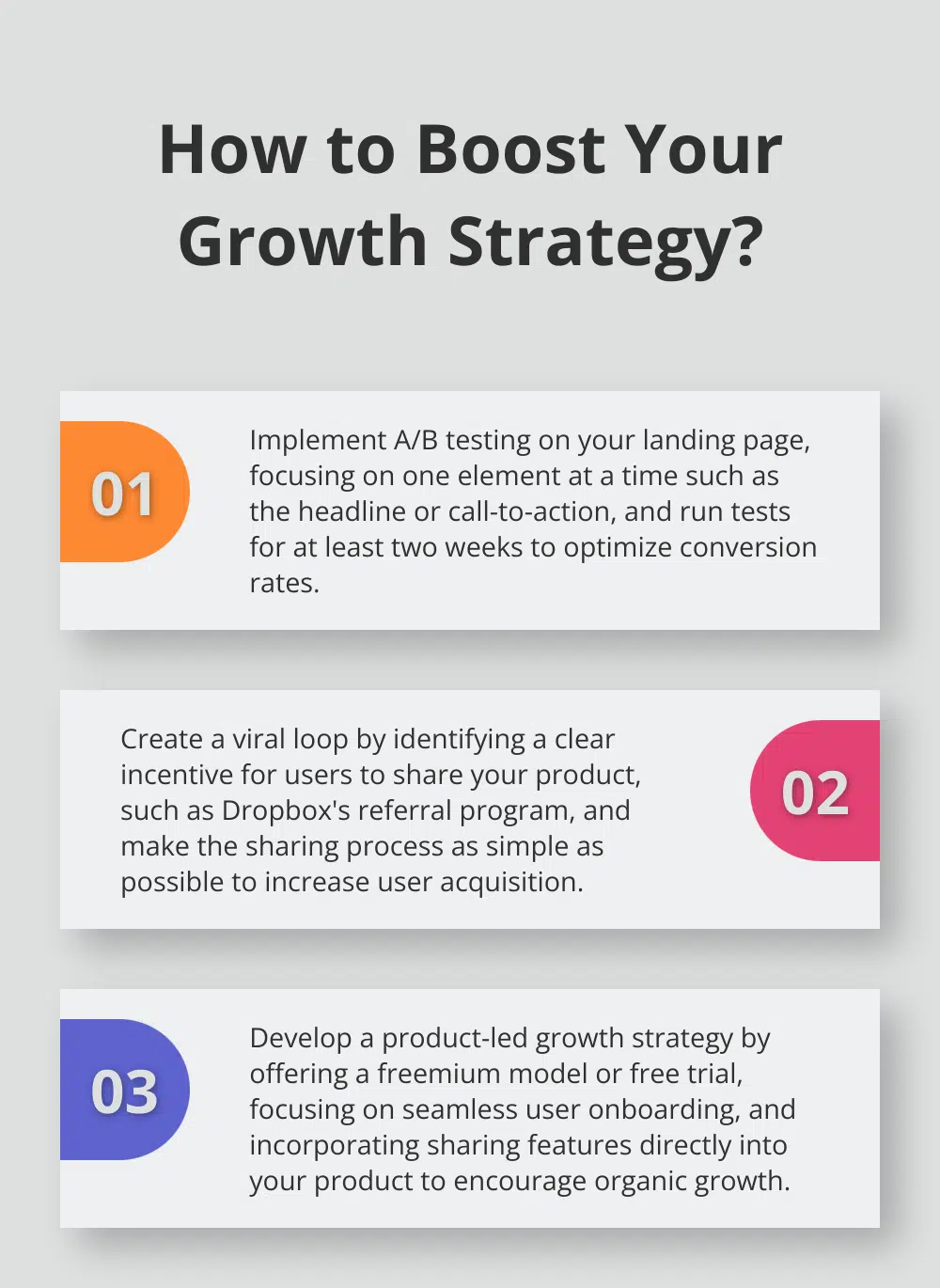
Implementing these strategies requires a systematic approach. You should identify your key metrics, set clear goals, and choose channels and strategies that align with your business model and target audience. Growth marketing is an iterative process that demands continuous testing, measurement, and refinement to find what works best for your unique situation.
For businesses looking to elevate their growth marketing strategies, Made Simpler offers comprehensive solutions tailored to drive results. Their AI-enhanced marketing services (including content creation, social media management, and sales automation) can help you implement these strategies effectively. The world of growth marketing evolves constantly, so stay curious and keep experimenting with new approaches.
